Oh hi.
Wondering what the tara Japanese meaning is?
Good! You’re at the right place.
This guide will teach you all about the tara Japanese grammar rule. And you’ll get examples to help drill int the meanings and usages of each form and variation below.
So, let’s jump in,
 | Want FREE Japanese Grammar & Vocab Cheat Sheets? Click Here to Get 20+ Cheat Sheets from JapanesePod101 (a Japanese learning program.) |
Rule #1: noun + dattara
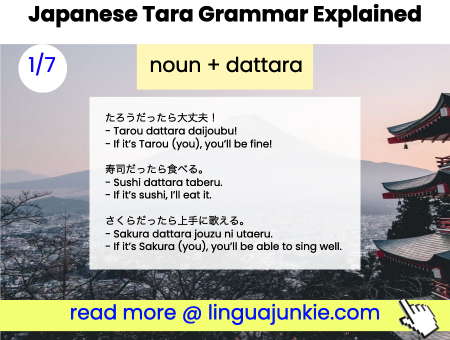
First, let’s start with the very common dattara Japanese grammar pattern.
- Summary: To state hypotheticals, “if” statements, “if, then” statements, as well as encouraging others. This form is for nouns only.
You can make “if” statements with nouns using dattara, which is a form of tara. It’s useful for giving encouragement to someone. For example, ともこだったら合格するよ。(Tomoko dattara goukaku suru yo), or “If it’s Tomoko (you), you’ll be accepted”. In Japanese, it’s common to use someone’s name as “you”. Other ways that you might use a noun + dattara would be when talking about the location of the noun. For example, 銀行だったら近くにあるよ。(ginkou dattara chikaku ni aru yo) or “If it’s the bank, there’s one close by”.
- たろうだったら大丈夫!
- Tarou dattara daijoubu!
- If it’s Tarou (you), you’ll be fine!
- 寿司だったら食べる。
- Sushi dattara taberu.
- If it’s sushi, I’ll eat it.
- さくらだったら上手に歌える。
- Sakura dattara jouzu ni utaeru.
- If it’s Sakura (you), you’ll be able to sing well.
Rule #2: noun + de (wa) nakattara
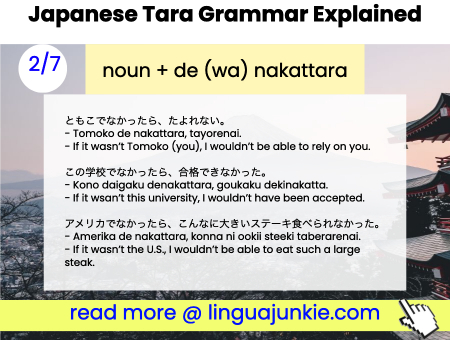
- Summary: Used for negative “if” statements. The opposite of rule 1 above.
If you want to make a negative “if” statement you’ll have to use de wa nakattara or de nakattara. Wa makes it a bit more formal sounding. Instead of a simple “if” statement, it becomes “If it wasn’t”. For example, 日本ではなかったら、美味しい寿司が食べられない。(Nihon de wa nakattara, oishii sushi ga taberarenai) or “If it wasn’t Japan, you couldn’t at delicious sushi”.
- ともこでなかったら、たよれない。
- Tomoko de nakattara, tayorenai.
- If it wasn’t Tomoko (you), I wouldn’t be able to rely on you.
- この学校でなかったら、合格できなかった。
- Kono daigaku denakattara, goukaku dekinakatta.
- If it wsan’t this university, I wouldn’t have been accepted.
- アメリカでなかったら、こんなに大きいステーキ食べられなかった。
- Amerika de nakattara, konna ni ookii steeki taberarenai.
- If it wasn’t the U.S., I wouldn’t be able to eat such a large steak.
Rule #3: i – adjective + tara
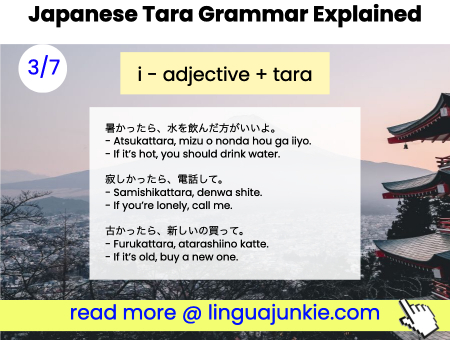
This is one of the most common tara Japanese grammar usages.
- Summary: “if” statements using i-adjectives.
Special care needs to be taken when forming tara sentences with an i-adjective. You have to take the past tense form of the adjective. For example, osoi, or “slow” become osokatta in the past tense. All you need to do is add ra to this form so it becomes osokattara. Similar to the other two rules, these also form “if” statements. You can say 電車がおそかったら、間に合わない。(densha ga osokattara mani awanai) or “If the train is late, I won’t make it in time”.
- 暑かったら、水を飲んだ方がいいよ。
- Atsukattara, mizu o nonda hou ga iiyo.
- If it’s hot, you should drink water.
- 寂しかったら、電話して。
- Samishikattara, denwa shite.
- If you’re lonely, call me.
- 古かったら、新しいの買って。
- Furukattara, atarashiino katte.
- If it’s old, buy a new one.
Rule #4: na-adjective + tara
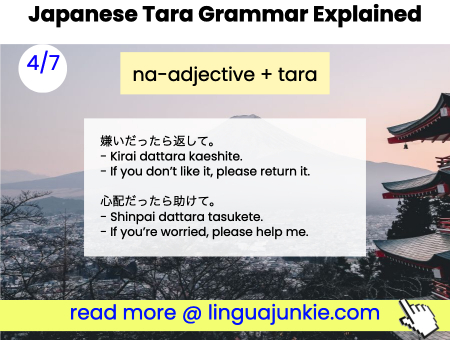
- Summary: “if” statements using na-adjectives.
Na-adjectives work similarly to i-adjectives but conjugate differently. You need to take the past tense form of the na-adjective. For example, shizuka, or “quiet” becomes shizukadatta in the past tense. Add ra to the end to make it a tara phrase. You can make a sentence like 図書館が静かだったら、勉強できた (toshokan ga shizuka dattara, benkyou dekita), “If the library was quiet, I could have studied”.
- 嫌いだったら返して。
- Kirai dattara kaeshite.
- If you don’t like it, please return it.
- 心配だったら助けて。
- Shinpai dattara tasukete.
- If you’re worried, please help me.
- 水がきれいだったら、泳いでみる。
- Mizu ga kirei dattara, oyoide miru.
- If the water is clean, I’ll try swimming.
Rule #5 verb + tara
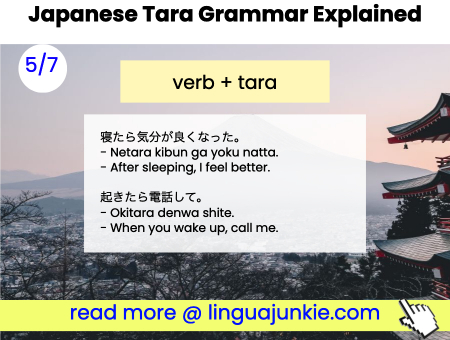
- Summary: Verbs with “tara” express what happens “after” the action is done, and can also mean “when.”
Verb’s with tara change the meaning from an “if” statement to an “after” statement or show a sequence of events. For example, you can say ご飯を食べたら、お腹がいっぱいになった。(Gohan o tabetara, onaka ga ippai ni natta), or “After eating food, I was full”. Keep in mind that even though it shows a sequence of events, you cannot put together phrases that don’t relate to each other. Make sure that the event that happens after tara is related to the previous one.
Verb + tara can also show statements like “when”. For example 大きくなったら、お医者さんになりたい。(ookiku nattara oishasan ni naritai), or “When I’m older I want to become a doctor”. Verbs must be changed to the past tense form in order to work with tara. For example, hashiru becomes hashitta in the past tense. This changes to hashittara with tara.
- 寝たら気分が良くなった。
- Netara kibun ga yoku natta.
- After sleeping, I feel better.
- 起きたら電話して。
- Okitara denwa shite.
- When you wake up, call me.
- テレビを見たら眠くなった。
- Terebi o mitara nemuku natta.
- After I watched T.V., I felt sleepy.
Rule #6: moshi + tara
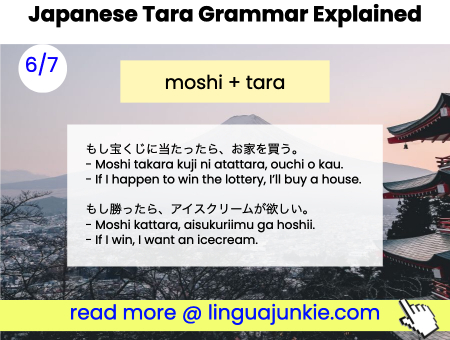
- Summary: Stating uncertain hypothetical statements. Moshi adds uncertainty.
Moshi can be added to the beginnings of a tara phrase. When adding moshi, you can only add it when it’s not sure that the sentence will come true. For example, もし合格したら、新しいパソコンを買う。(Moshi goukaku shitara atarashii pasokon o kau) or “If I happen to get accepted, I will buy a new computer”. In this way, the sentence is more of a wish for something to happen. Moshi can add uncertainty to a sentence.
- もし宝くじに当たったら、お家を買う。
- Moshi takara kuji ni atattara, ouchi o kau.
- If I happen to win the lottery, I’ll buy a house.
- もし勝ったら、アイスクリームが欲しい。
- Moshi kattara, aisukuriimu ga hoshii.
- If I win, I want an icecream.
Rule #7: verb + tara + ?

This is another one of the most common tara Japanese grammar usages.
- Summary: To suggest. “How about…” or “Why don’t you…”
A verb + tara can also form questions to create suggestion sentences. Instead of completing the conditional statement, you can leave it open-ended. For example, 勉強したら?(benkyou shitara?) means “Why don’t you study?”. This is very casual and can sound condescending if used in the wrong context.
- 遊びに行ったら?
- Asobi ni ittara?
- Why don’t you go out?
- 掃除したら?
- Souji shitara?
- Why don’t you clean?
- ご飯食べたら?
- Gohan tabetara?
- Why don’t you eat?
Conclusion – Back to You.
Now, I hope you have a decent idea of how this tara Japanese grammar rule is used.
- To make if/if then statements
- To encourage.
- To suggest.
- To make uncertain hypothetical statements.
If you want to practice, leave a comment.
Or, read through the rules some more.
If you want to save this page, go ahead and print it out.
Either way, thanks for reading and for learning Japanese with Linguajunkie.
Other grammar articles:
– The Main Lingua Junkie
 | Want FREE Japanese Grammar & Vocab Cheat Sheets? Click Here to Get 20+ Cheat Sheets from JapanesePod101 (a Japanese learning program.) |